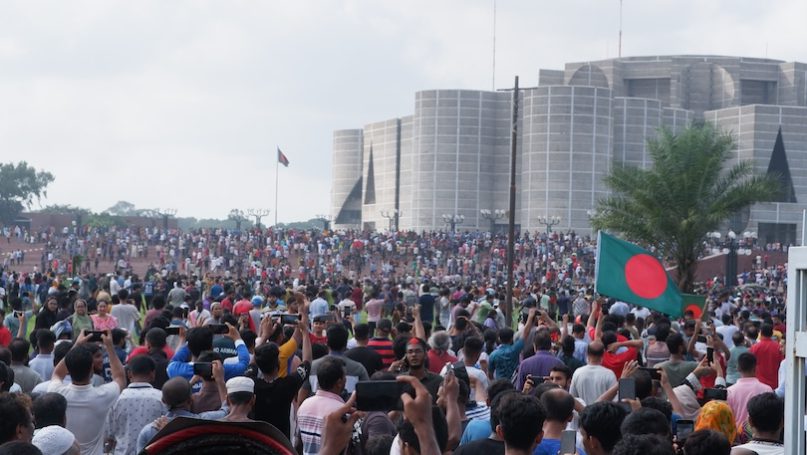
MDSABBIR/Shutterstock
Bangladesh stands at a crossroads in its political landscape, marked by contradictions and the potential for transformation. Against this backdrop, the recent overtures by the Bangladesh Nationalist Party (BNP) toward India are not merely diplomatic gestures but signify a critical juncture in the party’s quest for identity, authority, and national unity. This commentary seeks to unravel the complex interplay of these themes and reveal how the BNP’s current actions reflect profound philosophical questions about political legitimacy, collective memory, and the construction of identity.
At its core, the BNP grapples with the specter of a fractured identity, shaped by years of exclusion from power under the Awami League’s authoritarian regime. The party has been historically stigmatized, often conflated with Jamaat-e-Islami, a label that undermines its legitimacy and positions it as a mere footnote in Bangladesh’s political narrative. This conflation is not just a matter of political strategy; it is a profound denial of recognition that erases the BNP’s distinct contributions and aspirations. To emerge from this quagmire, the BNP must reclaim its narrative and disentangle itself from the shadows of past associations that have shaped public perception.
Mirza Fakhrul Islam Alamgir’s recent assertions regarding a thaw in relations with India reveal a calculated maneuver to reposition the BNP within the larger political discourse. However, this diplomatic pivot also poses significant risks. It is crucial to consider whether this alignment serves to reinforce the party’s autonomy or further entraps it in a narrative of dependence. The philosophical underpinnings of this dilemma echo the broader human condition, where the quest for agency is often impeded by external forces that shape identity and authority. For the BNP to effectively address this terrain, it must engage in a rigorous examination of its historical narratives. Embracing critical self-reflection will allow the party to acknowledge past mistakes while charting a course for future legitimacy.
Authority in politics is not merely a matter of power; it is fundamentally intertwined with the consent of the governed. The BNP must redefine its relationship with the electorate and move beyond a transactional understanding of political allegiance. This effort requires cultivating a deep engagement with the public based on the principles of democratic governance. The party’s credibility hinges on its ability to advocate for transparency and accountability while embodying the values of integrity that have been sorely lacking in the current political climate. In this regard, the BNP can draw from intellectual traditions that emphasize the importance of ethical leadership as a means of reclaiming authority.
Moreover, the dynamics of national unity play a pivotal role in the BNP’s struggle for relevance. As younger voters increasingly express disillusionment with the status quo, the party must position itself as a genuine representative of their aspirations. This involves transcending traditional political rhetoric to engage in meaningful dialogue about the pressing issues that affect everyday lives. By prioritizing grassroots engagement and advocating for social justice, the BNP can cultivate a collective identity that resonates with the diverse fabric of Bangladeshi society. The task is not merely to win votes but to inspire a renewed sense of belonging among citizens who yearn for representation.
Central to this endeavor is the empowerment of the individual, an imperative that resonates deeply within moral and philosophical discourses on agency and autonomy. For the BNP to forge a robust political identity, it must champion policies that elevate personal agency and empower individuals to take ownership of their futures. By prioritizing educational access and promoting critical thinking, the BNP can lay the foundation for an informed citizenry. This dedication not only promotes democratic engagement but also reflects a broader ethical and epistemic responsibility to create a society where every voice is valued. A well-informed electorate is essential for a vibrant democracy, one capable of holding leaders accountable and actively participating in governance.
Simultaneously, the BNP’s political strategies must grapple with the socio-economic disparities that persist in Bangladesh. By advocating for equitable development and inclusive policies, the party can set itself apart from the Awami League and establish its identity as a genuine champion of the marginalized. This focus on social welfare will enhance the BNP’s appeal across various demographic groups while contributing to the creation of a more just and equitable society.
As the political landscape evolves, the BNP must confront the pressing need to cultivate an identity that is independent of external influences. This challenge calls for a critical reevaluation of the party’s historical narratives and an embrace of local realities to oven a coherent vision for the future. The pursuit of authenticity, in this context, becomes a logical imperative that transcends mere political expediency. It requires a commitment to engage with the electorate on a human level and to recognize the shared struggles and aspirations that bring them together.
The BNP’s current diplomatic engagement with India embodies a complex struggle for identity, authority, and a meaningful connection with the electorate. The party’s success rests on its ability to create a coherent identity that resonates with the aspirations of the Bangladeshi people while addressing the region’s power dynamics. By prioritizing individual empowerment and community engagement, the BNP can redefine its role in Bangladeshi politics, challenge existing power structures, and inspire a new generation of political participation. At this critical moment, the path the BNP chooses will significantly influence the future of democracy in Bangladesh, which will light up the land with hope for a more inclusive and equitable political landscape. This situation calls for more than just political survival; it demands a renewed commitment to the principles of justice, equality, and human dignity that are essential for any meaningful democratic endeavor.
Further Reading on E-International Relations
About The Author(s)
Kazi A S M Nurul Huda is an associate professor of philosophy at the University of Dhaka. He holds a PhD in philosophy from the University of Oklahoma, USA. His main philosophical interests lie in epistemology, political philosophy, ethics, and their interconnections. He is also interested in applied philosophical and ethical areas, such as environmental philosophy, development ethics, business ethics, bioethics, and the philosophy of education. His work has been published in journals such as Developing World Bioethics, Business Ethics, the Environment, and Responsibility, Cultural Dynamics, International Journal of Applied Philosophy, Symposion and Philosophy and Progress. His most recent commentaries have been published in The Daily Star, The Diplomat, and E-International Relations.
Before you download your free e-book, please consider donating to support open access publishing.
E-IR is an independent non-profit publisher run by an all volunteer team. Your donations allow us to invest in new open access titles and pay our bandwidth bills to ensure we keep our existing titles free to view. Any amount, in any currency, is appreciated. Many thanks!
Donations are voluntary and not required to download the e-book - your link to download is below.

 Movie
Movie 2 months ago
65
2 months ago
65 





![Presidents Day Weekend Car Sales [2021 Edition] Presidents Day Weekend Car Sales [2021 Edition]](https://www.findthebestcarprice.com/wp-content/uploads/Presidents-Day-Weekend-car-sales.jpg)



 English (United States)
English (United States)